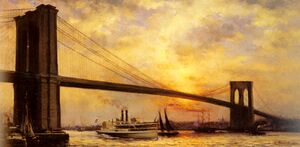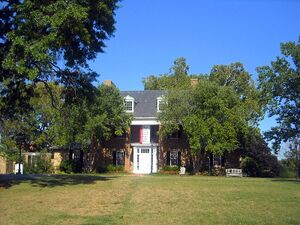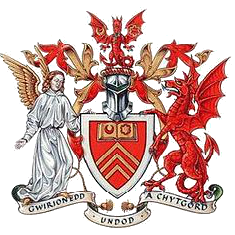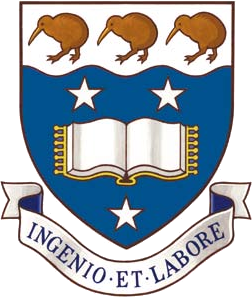Difference between revisions of "1883"
Jump to navigation
Jump to search
1873 < 1874 < 1875 < 1876 < 1877 < 1878 < 1879 <1880 < 1881 < 1882 < 1883 > 1884 > 1885 > 1886 > 1887 > 1888 > 1889 > 1890 > 1891 > 1892 > 1893
m (Text replacement - "{{year}} {{SMWDocs}} {{Stub}}" to "{{year |image= |image_width= |image_caption= }} {{SMWDocs}} {{Stub}}") |
(unstub) |
||
| (One intermediate revision by the same user not shown) | |||
| Line 1: | Line 1: | ||
{{year | {{year | ||
| − | |image= | + | |image=Renouf - View of the Brooklyn Bridge (1889).jpg |
|image_width= | |image_width= | ||
| − | |image_caption= | + | |image_caption=The Brooklyn Bridge is opened, signalling the ascendancy of [[New York]] as a world metropolis |
| + | |description=Year 1883 | ||
}} | }} | ||
| + | == Events == | ||
| + | * [[January 16]] – The [[Pendleton Civil Service Reform Act]], establishing the [[United States civil service]], is passed. | ||
| + | * [[March 20]] – The [[Paris Convention for the Protection of Industrial Property]] is held.<ref>https://books.google.com/books?id=x8GjDwAAQBAJ</ref> | ||
| + | * [[March 28]] – [[Battle of Gia Cuc]]: A French force defeats a Vietnamese in northern [[Vietnam]] in the run-up to the [[Sino-French War]]. | ||
| + | * [[May 24]] – [[Brooklyn Bridge]] is opened to traffic, after 13 years of construction. | ||
| + | * [[June 13]] – Count [[Arvid Posse]] leaves office as [[Prime Minister of Sweden]]. He is succeeded by [[Carl Johan Thyselius]], the first non-aristocrat (Swedish ; "''ofrälse''") to serve as Swedish head of government, and Prime Minister. | ||
| + | * [[June 28]] – In [[Milan]], Italy the first central European electricity [[power station]] is inaugurated. | ||
| + | * [[September 11]] – Major [[Evelyn Baring, 1st Earl of Cromer|Evelyn Baring]] becomes Consul-General of Egypt under British rule. | ||
| + | * [[October 30]] – Two [[Clan na Gael]] [[dynamite]] bombs explode in the [[London Underground]], injuring several people. The next day, [[Home Secretary]] [[William Vernon Harcourt (politician)|Vernon Harcourt]] drafts 300 policemen to guard the underground, and introduces the Explosives Bill. | ||
| + | * [[November 18]] – U.S. and Canadian railroads institute 5 standard continental [[time zone]]s, ending the confusion of thousands of local times. | ||
| + | * [[December 16]] - [[Tonkin Campaign]]: French forces capture the [[Sơn Tây]] citadel. | ||
| + | * [[December 21]] - The [[Royal Canadian Dragoons]] and The [[Royal Canadian Regiment]], the first Permanent Force cavalry and infantry regiments of the Canadian Army, are formed. | ||
| + | |||
| + | === Date unknown === | ||
| + | * German [[bacteriologist]] [[Robert Koch]] discovers the [[cholera]] [[bacillus]]. | ||
| + | * [[Otto von Bismarck]] pushes the first social security law through the [[Reichstag (German Empire)|Reichstag]]. | ||
| + | * The [[British Parliament]] considers a major bill to allow Indian judges to try Europeans in India. The British community rises in protest, and defeats the measure. | ||
| + | |||
| + | |||
{{SMWDocs}} | {{SMWDocs}} | ||
| − | + | ==References== | |
| + | <references/> | ||
Latest revision as of 12:04, 14 March 2021
 The Brooklyn Bridge is opened, signalling the ascendancy of New York as a world metropolis | |
| Year 1883 |
Events
- January 16 – The Pendleton Civil Service Reform Act, establishing the United States civil service, is passed.
- March 20 – The Paris Convention for the Protection of Industrial Property is held.[1]
- March 28 – Battle of Gia Cuc: A French force defeats a Vietnamese in northern Vietnam in the run-up to the Sino-French War.
- May 24 – Brooklyn Bridge is opened to traffic, after 13 years of construction.
- June 13 – Count Arvid Posse leaves office as Prime Minister of Sweden. He is succeeded by Carl Johan Thyselius, the first non-aristocrat (Swedish ; "ofrälse") to serve as Swedish head of government, and Prime Minister.
- June 28 – In Milan, Italy the first central European electricity power station is inaugurated.
- September 11 – Major Evelyn Baring becomes Consul-General of Egypt under British rule.
- October 30 – Two Clan na Gael dynamite bombs explode in the London Underground, injuring several people. The next day, Home Secretary Vernon Harcourt drafts 300 policemen to guard the underground, and introduces the Explosives Bill.
- November 18 – U.S. and Canadian railroads institute 5 standard continental time zones, ending the confusion of thousands of local times.
- December 16 - Tonkin Campaign: French forces capture the Sơn Tây citadel.
- December 21 - The Royal Canadian Dragoons and The Royal Canadian Regiment, the first Permanent Force cavalry and infantry regiments of the Canadian Army, are formed.
Date unknown
- German bacteriologist Robert Koch discovers the cholera bacillus.
- Otto von Bismarck pushes the first social security law through the Reichstag.
- The British Parliament considers a major bill to allow Indian judges to try Europeans in India. The British community rises in protest, and defeats the measure.
Events
| Event | Start | End |
|---|---|---|
| Pax Brittanica | 1815 | 1915 |
| Victorian era | 1840 | 1901 |
New Groups
| Group | Image | Type | Description |
|---|---|---|---|
| Sidwell Friends School |  | US deep state connected school | |
| Cardiff University |  | Public | One of the ten largest UK universities. |
| University of North Dakota |  | Offers courses in unmanned aircraft systems operations | |
| Auckland University |  | Public | the highest ranked New Zealand university |
| University of Auckland |  | Research Public | The largest university in New Zealand |
| Marmara University |  | Public | A leading institution of higher education in Turkey for 124 years |
| University of Texas at Austin |  | Flagship State university Space-grant university | The most liberal school in Texas. |
| University of Guayaquil |  | University | Traditionally left-wing politically active students |
| UK Special Branch |  |
Deaths
| Title | Born | Died | Place of death | Summary | Description |
|---|---|---|---|---|---|
| Richard Wagner | 22 May 1813 | 13 February 1883 | Songwriter | German composer, theater director, polemicist, and conductor, with large cultural influence | |
| Karl Marx | 5 May 1818 | 14 March 1883 | London United Kingdom UK | Author Socialism | Founder of Marxism, which has been interpreted many various ways ever since. |
Births
| Title | Born | Place of birth | Died | Summary | Description |
|---|---|---|---|---|---|
| William J. Donovan | 1 January 1883 | New York Buffalo | 8 February 1959 | Spook Soldier Deep politician | OSS director 1942-1945 |
| Otto Niemeyer | 1883 | 1971 | Banker | ||
| Frank Nelson | 1883 | 11 August 1966 | Spook Politician | British civil servant, intelligence officer and politician. | |
| Clement Attlee | 3 January 1883 | Surrey Putney UK | 8 October 1967 | Soldier Politician Lawyer | |
| Gunnar Jahn | 10 January 1883 | 31 January 1971 | Economist Statistician Central banker | Chair of the Norwegian Nobel Committee and Norwegian Central Bank | |
| Compton Mackenzie | 17 January 1883 | United Kingdom West Hartlepool County Durham UK | 30 November 1972 | Author Whistleblower Spook Politician | His 1932 memoirs was the first time the Secret Intelligence Service was mentioned in print. The book was immediately withdrawn and all remaining copies were destroyed. |
| Nelson Dean Jay | 7 March 1883 | US Illinois Elmwood | 6 June 1972 | Financier | David Rockefeller said: “Dean Jay is important, if for no other reason, because he was one of the ten Americans to be invited to the first Bilderberg Conference.” |
| Joseph Stilwell | 19 March 1883 | United States Florida Palatka | 12 October 1946 | Soldier | |
| Rui Ennes Ulrich | 20 April 1883 | Portugal Lisbon | 20 June 1966 | Academic Businessperson | Portuguese academic |
| Henricus Sneevliet | 13 May 1883 | Rotterdam | 13 April 1942 | Politician | |
| John Maynard Keynes | 5 June 1883 | United Kingdom Cambridge Cambridgeshire | 21 April 1946 | Economist | Very influential economist, Director of the Bank of England in the 1940s |
| Franz Kafka | 3 July 1883 | Prague Austria-Hungary Bohemia | 3 June 1924 | Author | “Someone must have slandered Josef K., for one morning, without having done anything truly wrong, he was arrested.” ― Franz Kafka, The Trial |
| Friedrich Flick | 10 July 1883 | 20 July 1972 | Businessperson | Friedrich Flick was a German industrialist and convicted Nazi war criminal. After the war, he reconstituted his businesses, becoming the richest person in West Germany, and one of the richest people in the world, at the time of his death in 1972. | |
| Vittorio Valletta | 28 July 1883 | 10 August 1967 | Businessperson | Bilderberg Steering committee member who attended 3 Bilderbergs in the 1950s as chairman of Fiat | |
| Benito Mussolini | 29 July 1883 | Italy Predappio | 28 April 1945 | Soldier Politician | |
| Frederick Marquis | 23 August 1883 | United Kingdom Lancashire Salford Ordsall | 14 December 1964 | Politician | |
| Norman Birkett | 6 September 1883 | Lancashire Ulverston | 10 February 1962 | Politician Judge Clergy | |
| Cudbert Thornhill | 4 October 1883 | Tibet | 1952 | Spook | |
| Harold Moulton | 7 November 1883 | US Michigan Le Roy | 14 December 1965 | Economist | |
| Thomas Elmer Braniff | 6 December 1883 | 10 January 1954 | Businessperson | US businessman killed in plane crash |
Many thanks to our Patrons who cover ~2/3 of our hosting bill. Please join them if you can.